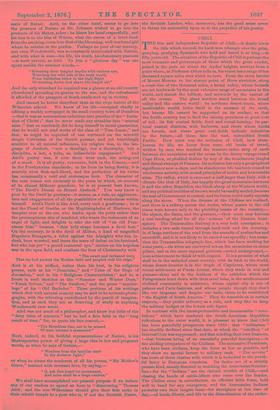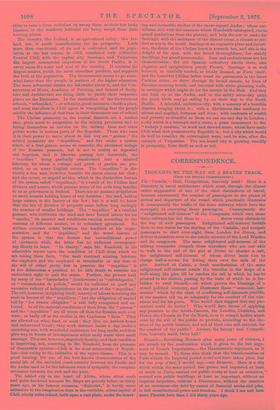CHILL
THE free and independent Republic of Chili,—it dearly loves the title which records its hard-won triumph over the grim, grasping, grudging Spaniards who held and hated it so long,—is fifty years old. The situation of the Republic of Chili is perhaps the most romantic and picturesque of those which the great condor, poised in the pure air about the Andes' heights, surveys from a point where, as Professor Orton tells us, his vision has a range of ten thousand square miles over which to rove. From the stern barrier of Mount Moreno to the stormy point of Horn stretches, along a coast-line of two thousand miles, a broad valley, whose bounds are set landwards by the most extensive range of mountains in the world, and almost the loftiest, and seawards by the vastest of all the oceans. The giant warders stand between the broad valley and the eastern world ; its northern desert-tracts, where incalculable wealth hides itself in the recesses of the earth, but human life cannot be supported on its surface, so that the fertile country has to feed the mining provinces at great cost of toil ; its fair central fields, fruit and cereal-bearing; its pas- toral austral districts, with harbours, and rivers whose banks are forests, and where great coal-fields indicate industries in the future,—ail these face the vast, untroubled South Pacific. How utter was the seclusion of Chili, how slum- berous its life, we know from some old books of travel, written by men who reached the treasure-laden strip of earth between the mountains and the ocean by the dreary voyage round Cape Horn, or plodded thither by way of the treacherous jungles and dismal swamps of Panama. Its seclusion has only a geographical significance now-a-days, and its slumberous life has been roused to wholesome activity,with sound principles of action and honourable aims. The valley, which is once-and-a-half larger than Italy, with a climate like that of Italy, has happily the great mountains between it and the other Republics, the black-sheep of the Western world ; and any political troubles of its own would be readily settled,because the seat of Government is central, and its forces could easily operate along the shore. When the dreams of the Chilians are realised, and there is a railway across the Andes, whose passes in the old times were known only to the plodding beasts of the country,— the alpaca, the llama, and the guanaco,—their coast may become a vast landing-wharf for all the ' notions' of the Eastern hemi- sphere. The Transandine Railway is a very bold conception ; it includes a two-mile tunnel through hard rock and the covering- in of large portions of the road from the assaults of avalanches and snowdrift, and it is not likely to be carried out speedily; but mean- time the Transandine telegraph-line, which has been working for some years,—its wires are conveyed across the mountains on stone pillars, and in the more exposed portions carried underground,— is an achievement to think of with respect. It is a promise of what shall be in the secluded coast-country, with its back to the world, whose desert-frontier is in the tropic of Capricorn, whose most recent settlement at Punta Arenas, where they trade in seal and guanaco-skins and in the feathers of the ostriches which the Patagonians hunt down with their cruel bolas, is the southernmost civilised community in existence, whose capital city is one of palaces and Paris fashions, and whose people though they don't like our language and despise our taste, claim to be considered "the English of South America." They do resemble us in certain respects,—they prefer solvency as a rule, and they like to keep the military budget at the lowest safe figure.
In contrast with the incomprehensible and innumerable " revo- lutions" which have rendered the South-American Republics ridiculous to the outer world, it is pleasant to know that Chili has been peacefully prosperous since 1852 ; that " militarism " has steadily declined since that date, at which the "rebellion " of General Cruz was suppressed ; and that minding their own business, —that business being of an essentially peaceful description,—is the abiding occupation of the Chilians. The successive Presidents, who have been civilians, keep the force as low as possible, and they show no special favour to military rank. " The service" has none of those charms with which it is bedecked to the youth- ful fancy in European countries. Its duties are of a strictly prosaic kind, mostly directed to watching the Araucanian frontier- line—for the " Indians " are the chronic trouble of Chili,—and chasing the bands of cattle-lifters who come over the border. The Chilian army is, nevertheless, an efficient little force, held well in hand for any emergency, and the Araucanian Indians probably owe their longish lease—for aborigines at this time of day,—of lands, liberty, and life to the disinclination of the autho- rities to raise a force sufficient to sweep them, as their less lucky kinsmen in the northern latitudes are being swept, from their hunting-plains.
The country, like Ireland, is an agricultural valley ; like Ire- land, too, it needs manufactures for its prosperity. Little more than one-fourth of its soil is cultivated, and its popu- lation at the last census, in 1875, numbered only 2,300,000. Central Chili, with the capital city, Santiago, and Valparaiso, the largest commercial emporium of the South Pacific, is in every sense the heart and soul of the country. It contains the largest estates, yields the most abundant produce, and supports the bulk of the population. The Government seems to go some- what faster than the people in matters of the higher education. The more influential classes are lukewarm about it, and the Con- servatory of Music, Academy of Painting, and School of Sculp- ture and Architecture are doing little to justify their respective places on the Estimates. In the curriculum of the Government schools, " urbanidad,"—or urbanity, good-manners—holds a place, and most travellers in Chili agree in recognising that the people exhibit the influence of that item in their demeanour out of school.
The Chili= peasantry in the central districts are a restless race, given much to emigration to the mining provinces and to hiring themselves as navvies on the railway lines and other public works in various parts of the Republic. Those who have it in their power to move about in this way are " peones ;" the settled peasantry are " inquilinos," and live under a system which, at a first glance, seems to resemble the abolished serfage of the Russian peasants, but is not in reality so degraded and hopeless, and is likewise passing into desuetude, the " inquilino " being gradually transformed into a salaried labourer, for whom a cottage and patch of garden are pro- vided, as on many English estates. The "inquilino " is dis- tinctly a free man, however humble his status among his class ; and the corvie, or unpaid service, which is the distinctive feature of the system called " inquilinaje," is a result of the Chilian land division and tenure, which present many of the evils long familiar to us as grievances in Ireland. There are no peasant-proprietors or small tenants holding leases of any duration ; the land, held in large estates, is the luxury of the few ; but it is well to know that the law of division of property must before long multiply the number of smaller holdings. The " inquffino " is a resident peasant, who cultivates the land and does forced labour for his "rancho," its amount and conditions varying according to the customs of different estates, or to voluntary agreement. No written contract exists between the landlord or his repre- sentative and the " inquilino," and the worst feature of the system is that the former has unconditional power of ejectment, while the latter has no sufficient correspond- ing liberty to leave. " In theory," says Mr. Rumbold, in his admirable report upon the condition of Chili from which we are taking these facts, " the tacit contract existing between the employer and the employed is terminable at any time at the will of either party, but in practice the " inquilino " is in too defenceless a position to be able freely to exercise his
undoubted right to quit the estate. Further, the powers held by many of the " hacendados " (landowners) as " subdelegados," or " comandantes de policia," would be sufficient to quell any excessive velleity of independence on the part of the " inquilino." The evil, however, is righting itself ; scarcity of labour is turning the scale in favour of the " inquilinos ;" but the obligation of unpaid toil by " los brazos obligados " is still fully recognised and en- forced. In all the material conditions of their lives, the " peones " and the " inquilinos " are all worse off than the Russian serfs ever were ; as badly off as the coolies in the Ceylonese " lines." They are allowed no wine, beer, or meat ; they live on haricot-beans and unleavened bread ; they work thirteen hours a day under a scorching sun, with wonderful endurance for long spells, and then give way to bursts of intemperance which sadly waste their small earnings. They are, however, singularly healthy, and their condition is improving, not, according to Mr. Rumbold, from the pressure of democratic opinion—Chili is the most aristocratic of Repub- lics—but owing to the initiative of the upper-classes. This is a good hearing, for one of the best known characteristics of the social life of the secluded coast-country between the Pacific and the Andes used to be the inhuman want of sympathy, the complete severance between the rich and the poor.
The fabled city in the heart of Africa, whose silver roofs and palm-bordered terraces Dr. Mayo set gravely before us thirty years ago, in his famous romance, "Kaloolah," is hardly more attractive to the imagination than is the veritable, actual capital of Chili, ninety miles inland, built upon a vast plain, under the tower- ing and invincible shelter of the snow-capped Andes ; whose cor- dilleras, rich with the treasures which Humboldt catalogued, rise in- grand gradations from the plateau, and help the sun to make for Santiago, with the assistance of the distant ocean, a climate as per- fect as any in the world. Santiago is an expensive place and luxuri- ous, the desire of the Chilian heart is towards her, and she is the delight of his eyes, with her broad thoroughfares, her stately dwellings, her grand promenades. Ease and exclusiveness are her .characteristics ; the old Spanish orthodoxy dwells there, also elegance and sprightliness purely French. Santiago is as well beloved, as carefully tended, as trimly dressed, as Paris itself; and the beautiful Chilian ladies tread its pavements in the latest Parisian attire, or drive through its broad streets, by lines of Parisian-seeming hotels, and convents with white gleaming walls, in carriages which might do for the muster in the Bois. And they can look up at the Andes, and in the sultry noon-day quiet the great birds may go sailing by on their way 'to the South Pacific. A splendid, ambitious city, with a memory of a horrible disaster hanging about it ; with a Malstrom-like tendency to attract and engulph fortunes and lives ; with contrasts of wealth and poverty as dreadful as those we can see any day in London a city which is a triumph and a snare, a great monument to the " trabajo y cordura," or work and shrewd sense, which have made- Chili what that praiseworthy Republic is ; but a city which would do well to consider its extravagant ways, and be wise, after the example of Valparaiso. The sea-board city is growing steadily in prosperity, from thrift as well as toil.



































 Previous page
Previous page